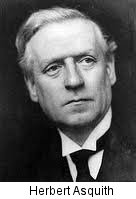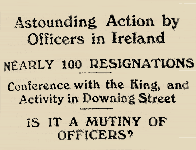Journal Volume 2 1995
The Landing of Arms and Ammunition at Kilcoole, County Wicklow by the Irish National Volunteers in 1914 (continued/1)
In September 1913 addressing some 50,000 members of the Orange Order and Unionist Clubs at Craigavon House, Sir Edward Carson warned all those present that they must be prepared for the moment when Home Rule became law and to prepare themselves to govern the Protestant province of Ulster.
Behind the scenes more militant members of the Unionist cause had discovered an ancient law which allowed the raising of a militia to protect the Union, and since Home Rule could be considered as a threat to the Union, sympathetic magistrates lost no time in approving applications for local militia to be raised and trained.
 While Unionists now bided their time, their worst nightmare was realised on April 11th 1912 when Prime Minister Asquith introduced the Third Home Rule in the House of Commons. Immediately the Unionist campaign of opposition got under way with dramatic urgency. On September 28th 1912, thousands of Unionists in Ireland and elsewhere signed the 'Ulster Covenant' which was a firm declaration by each person who signed it that they would do all in their power, by force if necessary, to defeat any attempt at imposing Home Rule.
While Unionists now bided their time, their worst nightmare was realised on April 11th 1912 when Prime Minister Asquith introduced the Third Home Rule in the House of Commons. Immediately the Unionist campaign of opposition got under way with dramatic urgency. On September 28th 1912, thousands of Unionists in Ireland and elsewhere signed the 'Ulster Covenant' which was a firm declaration by each person who signed it that they would do all in their power, by force if necessary, to defeat any attempt at imposing Home Rule.
In November 1913, the drift towards possible civil war over Home Rule came nearer with the creation of the Irish National Volunteers in Dublin. This organisation was infiltrated by members of the Irish Republican Brotherhood who saw it as a means of using force to remove the British from Ireland. The supporters of John Redmond and the Irish Parliamentary Party distanced themselves from the Irish National Volunteers who were formally inaugurated at a meeting in Dublin on November 25th 1913. The formation of a rival body to the Ulster Volunteers came as a shock to the Dublin Castle authorities who, fearful that the two organisations might engage in hostilities against each other and thus provoke a civil war, decided to try and control the situation though the imposition of a prohibition on the import of arms and ammunition into Ireland. This prohibition was invoked in early December 1913 and it had the counter effect of forcing both organisations to obtain their arms and ammunition by engaging in arms smuggling.
 1914 was to be an eventful year. In Ulster the Provisional Government prepared to seize power when Home Rule was enacted while the Government made plans to suppress the Provisional Government should they try to seize power even though it was known that the Ulster Volunteer Force would go into action.
1914 was to be an eventful year. In Ulster the Provisional Government prepared to seize power when Home Rule was enacted while the Government made plans to suppress the Provisional Government should they try to seize power even though it was known that the Ulster Volunteer Force would go into action.
In March 1914 both the Irish Parliamentary Party and British Government received a rude awakening when an incident known as the 'Curragh Mutiny' occurred. In the principal military base in Ireland a large number of officers made it clear that they would resign their commissions rather than lead their troops against the Provisional Government in Ulster if ordered to do so. The incident was very quickly glossed over as a misunderstanding and no action was taken against those officers who had indicated their intention not to follow orders.


